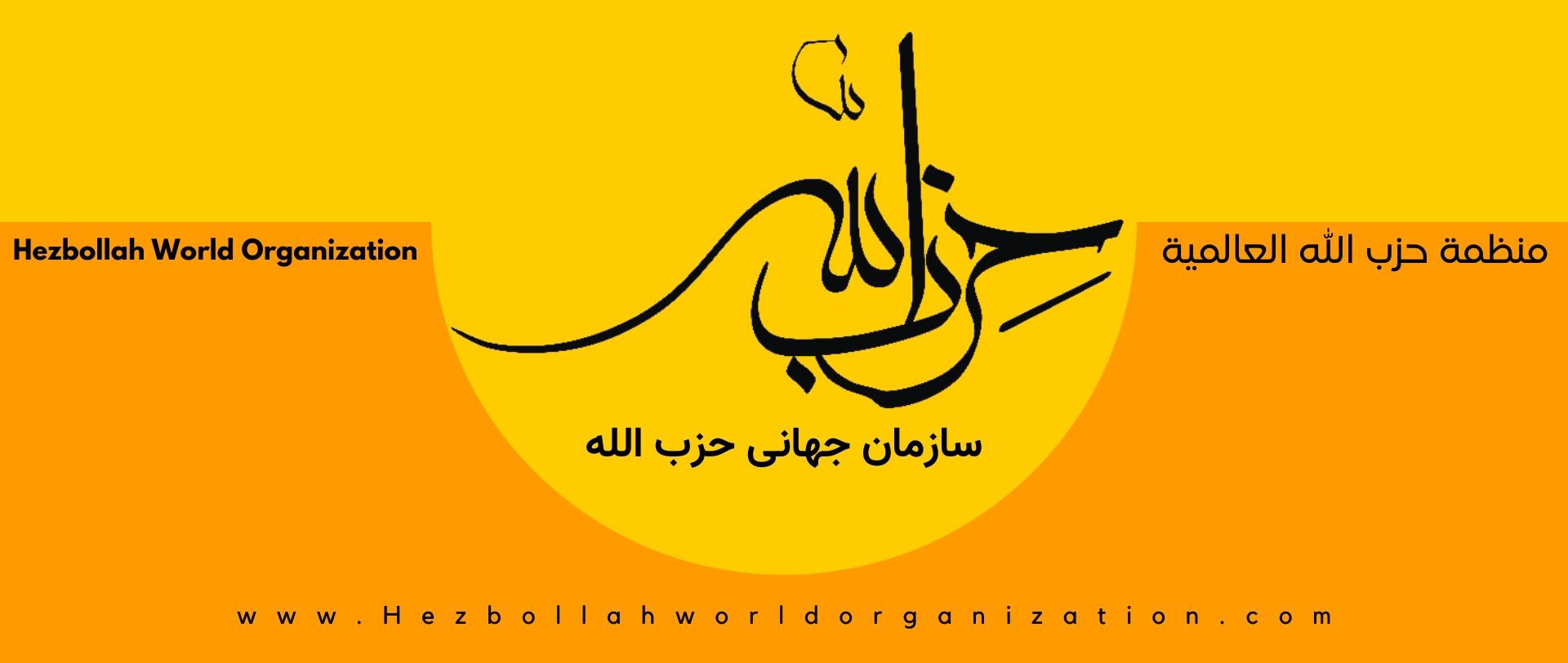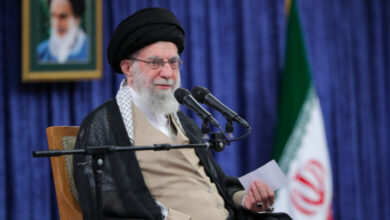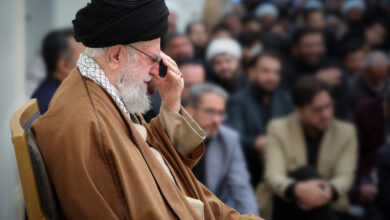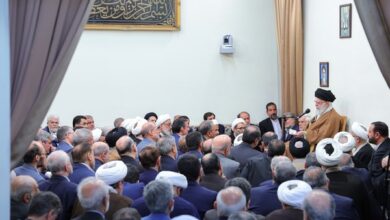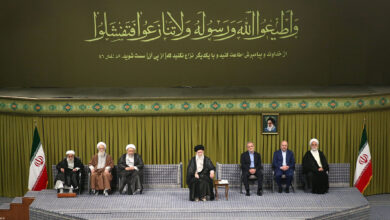The Leader’s remarks in the meeting with state officials
On the seventh day of the holy month of Ramadan 1446
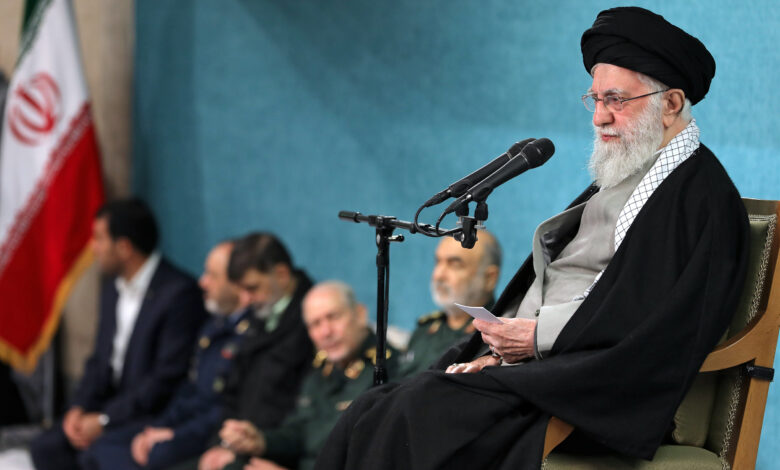
Foundational Principles (Asalat-ha)
Foundational Principle One: The Principle of the Leader of the Revolution’s Continuous Public Interaction with System Officials
1: Principle 1: The Principle of the Presence of All Officials in meetings with the Leader to facilitate:
* A: Presentation of detailed reports and their outcomes.
* B: Communication to the general public upon the Leader’s approval.
* C: Obtaining the Leader’s perspectives regarding these matters for their future work.
2: Principle 2: The Principle of the Necessity for Public Meetings between system officials and the Leader of the Revolution, characterized by:[1]
* A: The Leader’s reception being (or becoming) warm, pleasant, and cordial for the attendees.
* B: The presence of figures representing all factions within the system.
* C: The centrality of the head of the government/administration.
* D: Positive remembrance of the efforts and services of past and deceased serving officials.
3: Principle 3: The Principle of the Necessity for the Leader’s Governance Statements to officials to incorporate elements of Zikr (remembrance/mention/reminder), based on:[2]
* A: Mentioning the services and efforts of past and deceased officials.
* B: Reminding of the transient nature of responsibilities and lifespans.
* C: Reminding of the necessity of sincerity (Ikhlas) in officials’ activities to attain results in terms of otherworldly reward (Ajr).
4: Principle 4: The Principle of Appreciating the Extensive, Positive, and Useful Statements of officials, provided that:[3]
* A: The aforementioned officials pay mindful attention to the governance reminders (Azkar).
* B: There is valuable motivation and decisive determination embodying the will and capability (‘wanting and being able’), naturally coupled with reliance on God (Tawakkul)[4].
* C: A report on necessary actions to be taken in the near future is presented[5].
5: Principle 5: The Principle of the Leader Drawing Officials’ Attention to the requirements/exigencies of the specific time-frame (Zarf Zamani) concerning issues, activities, and their associated necessities and proprieties[6].
Foundational Principle Two: The Principle of Ramadan Being the Temporal Vessel/Context for Quranic Remembrance (Zikr)
(Initial Section on Zikr, Quran, and Ghaflat)
1: Principle 1: The Principle of the Quran Itself Being Zikr[7].
2: Principle 2: The Principle that Zikr Has a Temporal Context/Vessel[8].
3: Principle 3: The Principle of the Month of Ramadan Being a Temporal Context/Vessel of Zikr[9].
4: Principle 4: The Principle of the Quran Being the Book of Zikr[10].
5: Principle 5: The Principle of the Quran Being the Foundation/Capital of Every Zikr[11].
6: Principle 6: The Principle of the Antithetical Nature (one-to-one opposition) of Zikr versus heedlessness (Ghoflat) and forgetfulness[12].
7: Principle 7: The Principle of Necessarily Defining Zikr as the opposite point to heedlessness (Ghoflat) and forgetfulness, based on the axiom “Things are known by their opposites” (Tu’rafu al-ashya’u bi-addādiha)[13].
8: Principle 8: The Principle that Lacking Zikr (i.e., heedlessness/forgetfulness of God and consequently oneself) has present and future effects[14].
9: Principle 9: The Principle of the Effect of Forgetting God leading to:[15]
* A: Being forgotten and disregarded by God.
* B: Being cast out from the circle of God’s mercy and guidance.
* C: Divine abandonment (Khidlan) resulting from the withholding of good/support (Kheir)[16].
10: Principle 10: The Principle of the Effect of Heedlessness (Ghoflat) and Forgetfulness of God on individual and social self-forgetfulness[17].
11: Principle 11: The Principle of Defining Individual Self-Forgetfulness (resulting from God-forgetfulness) as forgetting:
* A: The purpose of creation, which is attaining existential virtues and consequently becoming God’s Caliph (Khalifa)[18].
* B: Forgetting the passage of life along with the sudden arrival of the appointed time/death (Ajal)[19].
* C: Being unprepared for accountability/response[20] regarding one’s mandated duties, encompassing both the omission of required actions and the commission of actions [subject to questioning][21].
12: Principle 12: The Principle of Overcoming Self-Forgetfulness through prayer (Du’a), supplication (Tadharru’), and acts of worship like fasting (or self-restraint against carnal desires)[22].
(Second Section focusing specifically on Ramadan)
Foundational Principle Two: The Principle of Ramadan Being the Temporal Vessel/Context for Quranic Remembrance (Zikr)
1: Principle 1: Ramadan as the Month of Zikr and Quran[23].
2: Principle 2: The Special Importance of Quran Recitation and Zikr of God during Ramadan[24].
3: Principle 3: The Quran as Zikr[25].
4: Principle 4: The Quran as a Complete Guide for Life[26].
5: Principle 5: The Quran Covering All Needs of Human Life[27].
6: Principle 6: The Quran and Narrations of the Infallibles (Ma’sumin, peace be upon them) as the primary foundations of the Islamic system[28].
7: Principle 7: The Impact of Zikr and the Quran on Preparedness for the Day of Resurrection (Qiyamah)[29].
8: Principle 8: Human Accountability at Qiyamah regarding actions performed and actions omitted[30].
9: Principle 9: Ramadan as an Opportunity for Self-Building (Khod-sāzi)[31].
10: Principle 10: Liberation from Heedlessness (Ghoflat) and attention to the Zikr of God through fasting, prayer (Du’a), and self-restraint[32].
11: Principle 11: Preparing Oneself for the Future and the meeting with God (Liqa’ Allah) during Ramadan[33].
12: Principle 12: Elimination of Heedlessness (Ghoflat) and Forgetfulness by means of the Quran[34].
13: Principle 13: Zikr as the Opposite Point to heedlessness (Ghoflat) concerning God, His bestowals, and oneself[35].
14: Principle 14: The Danger of Forgetting God and the resulting self-forgetfulness due to abandoning Zikr[36].
15: Principle 15: The Equivalence of Forgetting God with distancing from divine mercy and guidance, leading to otherworldly abandonment (Khidlan)[37].
16: Principle 16: Self-Forgetfulness Signifying:
* A: Forgetting the purpose of creation and the human mission[38].
* B: Heedlessness (Ghoflat) regarding preparation for the future[39].
* C: Heedlessness (Ghoflat) regarding the passage of life and death[40].
* D: Heedlessness (Ghoflat) regarding the divine questioning at Qiyamah[41].
* E: Heedlessness (Ghoflat) regarding individual and social responsibilities[42].
17: Principle 17: The Impact of Forgetting God and Self-Forgetfulness on:
* A: The future of humanity[43].
* B: Divine abandonment (Khidlan) and being forsaken by God[44].
18: Principle 18: The Correlation (Talazum) between social self-forgetfulness and forgetting the identity and mission of the Islamic Republic[45].
[1]. “A very warm welcome, dear brothers, dear sisters. It is a warm, pleasant, and cordial meeting, and praise be to God, one observes various faces. We hope, God willing, that hearts will draw ever closer. Last year in this meeting, Martyr Raisi (may God Almighty be pleased with him) was present and gave a detailed report on his actions, services, and efforts. And today, God willing, by the grace of God, they are receiving the reward for those efforts at the table of divine grace and mercy and are benefiting from it.” (Statements of the Leader in the meeting with system officials – March 8, 2024)
[2]. “With this perspective, you dear managers should look at these services. Life is in God’s hands; where we will be tomorrow, how we will be, is unknown. Look with this perspective, that if today you perform these services you have undertaken with sincerity, capability, and with the same kind of motivation that the honorable President expressed and demonstrated, its reward and recompense are so great that it cannot be rewarded in this world; Almighty God, in the shadow of His mercy, in Paradise, in the other world, God willing, will give you a good reward. Of course, good work also has its effects in this world.” (Statements of the Leader in the meeting with system officials – March 8, 2024)
[3]. “Firstly, I thank His Excellency Dr. Pezeshkian, the honorable President, for his statements. He delivered extensive, good, and useful statements.” (Statements of the Leader in the meeting with system officials – March 8, 2024)
[4]. “What draws my attention, and I have told him this many times, is the state of motivation that exists in him; this is very valuable. This motivation, this feeling that ‘we can, we will certainly do it, we pursue it, we rely on God, we don’t rely on anyone but God,’ this state in him is very valuable, and God willing, with divine help, they will be able to accomplish these tasks.” (Statements of the Leader in the meeting with system officials – March 8, 2024)
[5]. “I hope, God willing, that in the not-too-distant future, he will stand before the assembly and announce the realization of these great desires, give glad tidings to the people, and make the people happy.” (Statements of the Leader in the meeting with system officials – March 8, 2024)
[6]. “The topic that I have prepared here to present is a discussion about the month of Ramadan, and I have also prepared some remarks regarding the issues the country is facing, inasmuch as they relate to our gathering, which I will present.” (Statements of the Leader in the meeting with system officials – March 8, 2024)
[7]. “The month of Ramadan is the month of the Quran. The Quran is also the Book of Zikr (Remembrance/Reminder): ‘Indeed, it is We who sent down the Zikr’ [Quran 15:9] in Surah Al-Hijr, or ‘And this is a blessed Zikr which We have sent down. Then are you believers averse to it?’ [Quran 21:50] in Surah Al-Anbiya, and numerous other verses. The Quran is Zikr, it is the source of Zikr, it is the Book of Zikr.” (Statements of the Leader in the meeting with system officials – March 8, 2024)
[8]. “Regarding the month of Ramadan, the month of Ramadan is the month of Zikr.” (Statements of the Leader in the meeting with system officials – March 8, 2024)
[9]. “Regarding the month of Ramadan, the month of Ramadan is the month of Zikr.” (Statements of the Leader in the meeting with system officials – March 8, 2024)
[10]. “The month of Ramadan is the month of the Quran. The Quran is also the Book of Zikr: ‘Indeed, it is We who sent down the Zikr’ [Quran 15:9] in Surah Al-Hijr, or ‘And this is a blessed Zikr which We have sent down. Then are you believers averse to it?’ [Quran 21:50] in Surah Al-Anbiya, and numerous other verses. The Quran is Zikr, it is the source of Zikr, it is the Book of Zikr.” (Statements of the Leader in the meeting with system officials – March 8, 2024)
[11]. “The month of Ramadan is the month of the Quran. The Quran is also the Book of Zikr: ‘Indeed, it is We who sent down the Zikr’ [Quran 15:9] in Surah Al-Hijr, or ‘And this is a blessed Zikr which We have sent down. Then are you believers averse to it?’ [Quran 21:50] in Surah Al-Anbiya, and numerous other verses. The Quran is Zikr, it is the source of Zikr, it is the Book of Zikr.” (Statements of the Leader in the meeting with system officials – March 8, 2024)
[12]. “What does Zikr mean? Zikr is the opposite point of Ghoflat (heedlessness) and forgetfulness. One of the significant afflictions of humankind is forgetfulness; one forgets a necessary task, one forgets a useful matter. However, what is detrimental and irreparable are two main types of forgetfulness: first, forgetting God, that a person forgets God; second, forgetting one’s own self.” (Statements of the Leader in the meeting with system officials – March 8, 2024)
[13]. “Forgetting this God and forgetting oneself is a type of forgetfulness that is indescribable in terms of the blow it deals to a person’s future.” (Statements of the Leader in the meeting with system officials – March 8, 2024)
[14]. “Forgetting this God and forgetting oneself is a type of forgetfulness that is indescribable in terms of the blow it deals to a person’s future.” (Statements of the Leader in the meeting with system officials – March 8, 2024)
[15]. “It is alluded to in the Quran, explicitly stated; in one place it says, ‘nasū Allāha fanasiyahum’ [Quran 9:67]; ‘They forgot Allah, so He forgot them’. God forgetting someone has a metaphorical meaning, because God does not forget anyone or anything. Its metaphorical meaning is that Almighty God casts him out of the circle of His mercy and guidance. Forgetting God means this. ‘Nasiyahum’ means He no longer places him under the gaze of His grace, He abandons him (makhdhūl); ‘Khazalahu Allah’ (May God abandon him). One of the most significant curses is ‘Khazalahu Allah’. ‘Khidlan’ (abandonment) means leaving someone to their own devices, disregarding them, not helping them, not thinking of them. This is Khidlan. ‘Nasiyahum’ means this.” (Statements of the Leader in the meeting with system officials – March 8, 2024)
[16]. “Therefore, in the prayer of Sahifa Sajjadiyya, one of the things requested from God with seriousness and intensity, in that famous prayer, is ‘wa lā tursilnī min yadika irsāla man lā khayra fīh’ [Do not send me away from Your hand like one in whom there is no good]. ‘Irsāl’ in Arabic, in these contexts, means throwing away. That is, do not throw me away from Your hand like something worthless, useless. ‘wa lā tursilnī min yadika irsāla man lā khayra fīh’. This is divine forgetfulness [of the servant], the retribution for which is that God creates such a state, such a condition for him, which is the greatest loss.” (Statements of the Leader in the meeting with system officials – March 8, 2024)
[17]. “Human self-forgetfulness is mentioned in the blessed Surah Al-Hashr: ‘wa lā takūnū kalladhīna nasū Allāha fa-ansāhum anfusahum’ [And be not like those who forgot Allah, so He made them forget themselves – Quran 59:19]; ‘He made them forget themselves. They forgot God, so Almighty God made them forget themselves,’ meaning they became afflicted with self-forgetfulness. Well, humans are always dealing with the daily affairs of life and do not forget these. This ‘insā’ al-nafs’ (making the self forget), meaning God afflicting someone with self-forgetfulness, has a profound meaning both on the individual scale and on the social scale.” (Statements of the Leader in the meeting with system officials – March 8, 2024)
[18]. “On the individual scale, the meaning of a person forgetting themselves is that they forget the purpose of their own creation. Well, we believe that Almighty God acts with wisdom; why did He create us? For what purpose? This is an important question. Almighty God Himself, the Awliya (friends/saints) of God, the Prophets, and the Imams of Guidance (peace be upon them) have also stated why God created us; God created [us] to bring humans to the high ranks of existential virtue, to transform them into the Caliph of God (Khalifatullah); this is the purpose of human creation. He created him to make him great, to bring him to a lofty station.” (Statements of the Leader in the meeting with system officials – March 8, 2024)
[19]. “In the Quran, in the narrations, in the words of the Infallibles (peace be upon them) and the Awliya, this has been repeatedly reiterated; [self-forgetfulness means] a person being heedless of this and becoming unaware that they were created for this purpose. Forgetting the passage of life is also one aspect of self-forgetfulness.” (Statements of the Leader in the meeting with system officials – March 8, 2024)
[20]. “Ultimately, this life is passing; one becomes heedless. We all have an end point, it is clear: ‘Innaka mayyitun wa innahum mayyitūn’ [Indeed, you are to die, and indeed, they are to die – Quran 39:30]. The name for this end point in Arabic expression is ‘ajal’, we have an appointed time. We forget the ‘ajal’. This ‘ajal’ might be in an hour, it might be tomorrow, it might be next year. Ultimately, we must prepare ourselves for it. This is one instance of self-forgetfulness. In the noble supplication of Abu Hamza [al-Thumali, we read]: ‘lam umahhid’hu li raqdatī’ – the expression is like this – If You take me from the world in my current state where I have not prepared [myself] – I have not prepared myself, I have not prepared my grave – if I die in this state, woe is me! One becomes heedless that they must prepare themselves, see the future, become ready to enter the meeting with God (Liqa’ Allah). Well, these are personal heedlessnesses.” (Statements of the Leader in the meeting with system officials – March 8, 2024)
[21]. “If this heedlessness is removed, then the divine questioning comes to a person’s mind, and we pay attention that we will be subjected to divine questioning. The noble verse of the Quran [states]: ‘Fa-lanas’alanna alladhīna ursila ilayhim wa lanas’alanna al-mursalīn’ [Then We will surely question those to whom [messengers] were sent, and We will surely question the messengers – Quran 7:6]. We will question those people to whom We sent the Prophet, and they must answer what they did, how they reacted, and also ‘wa lanas’alanna al-mursalīn’; We will also question the Prophet himself. Consider the magnificent status of the Prophet. Almighty God asks: What did you do? How did you behave? We are in this position. If a person remembers this state, then a change occurs in their behavior. In the supplication of Abu Hamza [we read]: ‘Irḥamnī idhā inqaṭaʿat ḥujjatī wa kalla ʿan jawābika lisānī wa ṭāsha ʿinda suʾālika iyyāya lubbī’ [Have mercy on me when my argument is cut off, and my tongue fails to answer You, and my intellect becomes scattered when You question me]. When in the divine presence, on the Day of Resurrection, a person is questioned, well, they make excuses; [they are asked] that action, why was it performed? That omission, why did it occur? One must answer. One makes excuses; the same excuses we make for each other in this world: ‘It couldn’t be done for this reason, it couldn’t be done for that reason’. They will convince us that no, this excuse is not correct, this reasoning is not correct. There, my argument (hujjah), my reasoning, my excuses are cut off: ‘idhā inqaṭaʿat ḥujjatī wa kalla ʿan jawābika lisānī’; one’s tongue is tied before the divine questioning. ‘wa ṭāsha ʿinda suʾālika iyyāya lubbī’; one’s mind becomes scattered and dispersed before these questions. Well, when Zikr is attained, when this state arises for a person that we have this responsibility, it affects our behavior. This is self-forgetfulness.” (Statements of the Leader in the meeting with system officials – March 8, 2024)
[22]. “These [heedlessnesses], through prayer (Du’a), through supplication (Tadharru’), through fasting, through self-restraint regarding carnal desires that exist during fasting. One can bring about this Zikr, this attention, through prayer, through supplication, through fasting, through self-restraint regarding the carnal desires present in fasting, and save oneself from this self-forgetfulness.” (Statements of the Leader in the meeting with system officials – March 8, 2024)
[23]. “The month of Ramadan is the month of Zikr, the month of the Quran.” (Statements of the Leader in the meeting with system officials – March 8, 2024)
[24]. “The month of Ramadan is the month of Zikr, the month of the Quran. The Quran is also the Book of Zikr.” (Statements of the Leader in the meeting with system officials – March 8, 2024)
[25]. “The Quran is also the Book of Zikr. What does Zikr mean? Zikr is the opposite point of Ghoflat (heedlessness) and forgetfulness.” (Statements of the Leader in the meeting with system officials – March 8, 2024)
[26]. “The Quran has left nothing out. The structure (shākilah) of the Islamic system is this: based on Quranic principles and ideals.” (Statements of the Leader in the meeting with system officials – March 8, 2024)
[27]. “The Quran has left nothing out. In the interpretation (Tafsir) of the Quran, in the explanation (Tabyīn) of Quranic concepts, our narrations (Riwayat), the words of the Infallibles (peace be upon them), the noble Nahj al-Balagha itself, nothing has been left out.” (Statements of the Leader in the meeting with system officials – March 8, 2024)
[28]. “The structure of the Islamic system is this: based on Quranic principles and ideals. We must move towards these ideals.” (Statements of the Leader in the meeting with system officials – March 8, 2024)
[29]. “When Zikr is attained, when this state arises for a person that we have this responsibility. On the Day of Resurrection, a person has no excuse.” (Statements of the Leader in the meeting with system officials – March 8, 2024)
[30]. “We will be questioned by God. We must answer: What did we do? How did we act?” (Leader’s remarks in a meeting with system officials – March 8, 2025)
[31]. “The month of Ramadan is the month of remembrance. Through prayer, supplication, fasting, and self-restraint, a person can cultivate this remembrance.” (Leader’s remarks in a meeting with system officials – March 8, 2025)
[32]. “Through prayer, supplication, fasting, and self-restraint, a person can cultivate this remembrance.” (Leader’s remarks in a meeting with system officials – March 8, 2025)
[33]. “A person may become heedless of the need to prepare themselves… to prepare for meeting God.” (Leader’s remarks in a meeting with system officials – March 8, 2025)
[34]. “The Quran is a reminder, a source of remembrance. Remembrance is the opposite of heedlessness and forgetfulness.” (Leader’s remarks in a meeting with system officials – March 8, 2025)
[35]. “Remembrance is the opposite of heedlessness and forgetfulness.” (Leader’s remarks in a meeting with system officials – March 8, 2025)
[36]. “There are two main types of forgetfulness: forgetting God and forgetting oneself… These two forms of forgetfulness are indescribable in terms of the damage they cause to a person’s future.” (Leader’s remarks in a meeting with system officials – March 8, 2025)
[37]. “Forgetting God, as if God forgets someone, has a metaphorical meaning… God removes them from the circle of His mercy and guidance.” (Leader’s remarks in a meeting with system officials – March 8, 2025)
[38]. “Self-forgetfulness means forgetting the purpose of one’s creation… God created us to elevate humanity to the highest levels of existential virtue.” (Leader’s remarks in a meeting with system officials – March 8, 2025)
[39]. “A person may become heedless of the need to prepare themselves… to prepare for meeting God.” (Leader’s remarks in a meeting with system officials – March 8, 2025)
[40]. “A person may become heedless of the fact that this life is fleeting… they must prepare themselves for the future.” (Leader’s remarks in a meeting with system officials – March 8, 2025)
[41]. “A person may become heedless of the fact that they will be questioned by God on the Day of Judgment… they must answer: What did they do? How did they act?” (Leader’s remarks in a meeting with system officials – March 8, 2025)
[42]. “Self-forgetfulness means a person becomes negligent of their responsibilities toward God and society.” (Leader’s remarks in a meeting with system officials – March 8, 2025)
[43]. “These two forms of forgetfulness are indescribable in terms of the damage they cause to a person’s future.” (Leader’s remarks in a meeting with system officials – March 8, 2025)
[44]. “Forgetting God means God removes them from the circle of His mercy and guidance. Divine abandonment means leaving someone to their own devices.” (Leader’s remarks in a meeting with system officials – March 8, 2025)
[45]. “Social forgetfulness means forgetting our identity, forgetting the existential philosophy of the Islamic Republic.” (Leader’s remarks in a meeting with system officials – March 8, 2025)
For the full text, please refer to the Products section.
